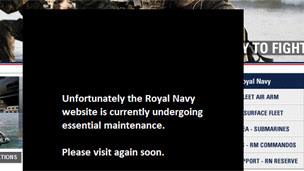Royal Navy website attacked by Romanian hacker
- Published

The Royal Navy website has been suspended while security teams investigate
The Royal Navy's website has been hacked by a suspected Romanian hacker known as TinKode.
The hacker gained access to the website on 5 November using a common attack method known as SQL injection.
TinKode published details of the information he recovered, which included user names and passwords of the site's administrators.
A Royal Navy spokesperson confirmed the site had been compromised and said: "There has been no malicious damage."
They added that as a precaution the site has been "temporarily suspended" and that security teams were investigating how the hacker got access. They said no confidential information had been disclosed.
The Royal Navy website currently shows a static image on which is a black box bearing the text: "Unfortunately the Royal Navy website is undergoing essential maintenance. Please visit again soon."
TinKode first mentioned the attack on his Twitter stream and added a web link to a page that contained more details about what he had found.
This text file contained the names of the site's administrators and many regular users.
The attack used to get the information compromises the database used to run a site by sending malformed queries and analysing the responses this generates.
Graham Cluley, senior security analyst at Sophos, said the incident was "immensely embarrassing, particularly in the wake of the recent security review where hacking and cybercrime attacks were given the top priority.
"Now we have the Royal Navy with egg on its face."
Mr Cluley said the hacker had apparently gained access to the Navy's blog, Jackspeak, and to an area called Global Ops.
"He's obviously more of a show-off type of hacker rather than malicious," said Mr Cluley.
"But if he'd wanted to he could have inserted links which would have taken the website's readers to malicious sites."
Tinkode has apparently carried out 52 separate defacements of websites in the last 12 months, according to website ZoneH.
Targets included everything from small businesses to adult websites. He has also uncover vulnerabilities in high-profile sites such as Youtube.
- Published4 November 2010
- Published18 October 2010
- Published14 October 2010